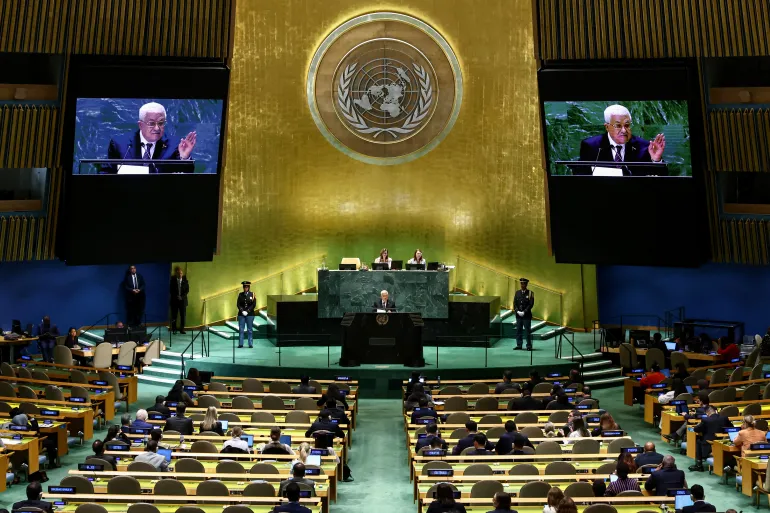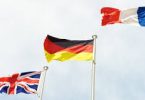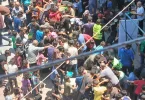Daoud Kuttab
As world leaders are preparing to gather in New York for the 80th session of the United Nations General Assembly (UNGA) in September, one nation will not have any representatives: the Palestinian people. That is because the United States Department of State has decided to deny visas to Palestinian officials seeking to attend the UNGA session.
Since 1947, the US has mostly honoured its “headquarters agreement” with the UN, granting visas — albeit limited in scope — to officials from around the world invited to attend UN meetings. There have been occasions, however, where the US has used its position as a UNGA host to deny visas to foreign diplomats from countries it wished to isolate, such as Russia, Iran, Venezuela and others.
In the case of Palestine, this is not the first time Palestinian leaders have faced a visa denial. In 1988, Yasser Arafat, the leader of the Palestine Liberation Organization (PLO), was also not allowed to come to the UN to participate in the UNGA, with the US government justifying its decision with “security threats”.
Today, the Trump administration is offering a similar justification, claiming the decision reflects US “national security interests” and accusing the Palestinian Authority (PA) of “not complying with their commitments, and … undermining the prospects for peace”.
The official US rationale that the PA has failed to repudiate “terrorism”, including the October 7, 2023 attacks, is flimsy. Under President Mahmoud Abbas, the Palestinian leadership has consistently condemned “terrorism”, including the attacks, and has gone even further by supporting the French-Saudi statement that called for Hamas’s disarmament.
It is important to remember that the PA was created by the 1993 Oslo Accords, which were signed at the White House by Arafat and Israeli Prime Minister Yitzhak Rabin, with US President Bill Clinton hosting the ceremony. In the following years, the PA received substantial support from Washington, including a significant amount of funds, and went along with any US-led peace initiative.
In this regard, to accuse the PA of “undermining the prospects for peace” is simply absurd. The reason for the visa denials clearly lies elsewhere.
The Trump administration’s decision coincides with a global moment where leaders of several Western countries have expressed their intention to recognise Palestine at the UNGA this month. It is expected that by the end of September, France, Canada, the United Kingdom, Australia, Portugal, and Malta may join the 147 UN member states that already recognise Palestinian statehood.
The Trump administration has been pressuring these countries not to go forward with their plan. Since that may not work, Washington is likely trying to deny the Palestinians an opportunity to celebrate this moment and a platform to speak out about the continuing Israeli atrocities in Gaza and the occupied West Bank.
By contrast, Israeli Prime Minister Benjamin Netanyahu will be welcomed with open arms in the US. Despite the International Criminal Court (ICC) issuing a warrant for his arrest, Netanyahu has been the most frequent guest at the White House since Trump’s inauguration; he will also be in attendance at the UNGA. Curiously, in 2013, the US government denied a visa to Sudanese President Omar al-Bashir, citing his ICC arrest warrant.
While denying the Palestinians a platform at the UN, the US has also been complicit in the Israeli campaign to silence Palestinian journalists.
The US decision to deny Palestinian diplomats visas came just five days after Israel bombed Gaza’s Naser Hospital, killing 22 people, including five Palestinian journalists. This brought the number of journalists Israel has killed since the start of the war to 244. The Trump administration failed to condemn the attack. Two weeks earlier, when the Israeli army targeted and killed four Al Jazeera journalists, the State Department appeared to endorse the Israeli narrative that they were “part of Hamas”.
This comes on the tail of the US government’s inaction on a number of other Israeli targeted killings of journalists, including that of senior American-Palestinian journalist Shireen Abu Aqleh in May 2022 and of my friend and colleague Nazeh Darwazeh, who was killed in 2003 while working for The Associated Press.
The US is clearly committed to helping Israel deny Palestinians a platform and a voice to speak to the world and present their case for statehood.
As Matt Duss, executive vice president of the Washington, DC-based Center for International Policy, put it in a tweet: the visa denial is “a perfect expression of decades of US policy toward the Palestinians: we’ll punish you for violence, but we’ll also punish you for non-violence”.
If even a compliant Palestinian body that has renounced armed struggle is not allowed to speak, then who is? Who can speak for the Palestinians?
The current US position appears to be supporting the Israeli occupiers’ efforts to remove Palestinians from their homeland and erase Palestinian self-determination. But you cannot wish away an entire people from the face of the Earth, even if you are the sole superpower on it.
Courtesy: aljazeera







